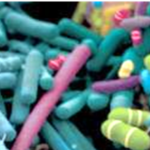Link to Pubmed [PMID] – 34668734
Link to DOI – 10.1128/CMR.00136-21
Clin Microbiol Rev 2021 Oct; (): e0013621
Several human intestinal microbiota studies suggest that bacteriophages, viruses infecting bacteria, play a role in gut homeostasis. Currently, bacteriophages are considered a tool to precisely engineer the intestinal microbiota, but they have also attracted considerable attention as a possible solution to fight against bacterial pathogens resistant to antibiotics. These two applications necessitate bacteriophages to reach and kill their bacterial target within the gut environment. Unfortunately, exploitable clinical data in this field are scarce. Here, we review the administration of bacteriophages to target intestinal bacteria in mammalian experimental models. While bacteriophage amplification in the gut was often confirmed, we found that in most studies, it had no significant impact on the load of the targeted bacteria. In particular, we observed that the outcome of bacteriophage treatments is linked to the behavior of the target bacteria toward each animal model. Treatment efficacy ranges from poor in asymptomatic intestinal carriage to high in intestinal disease. This broad range of efficacy underlines the difficulties to reach a consensus on the impact of bacteriophages in the gut and calls for deeper investigations of key parameters that influence the success of such interventions before launching clinical trials.


